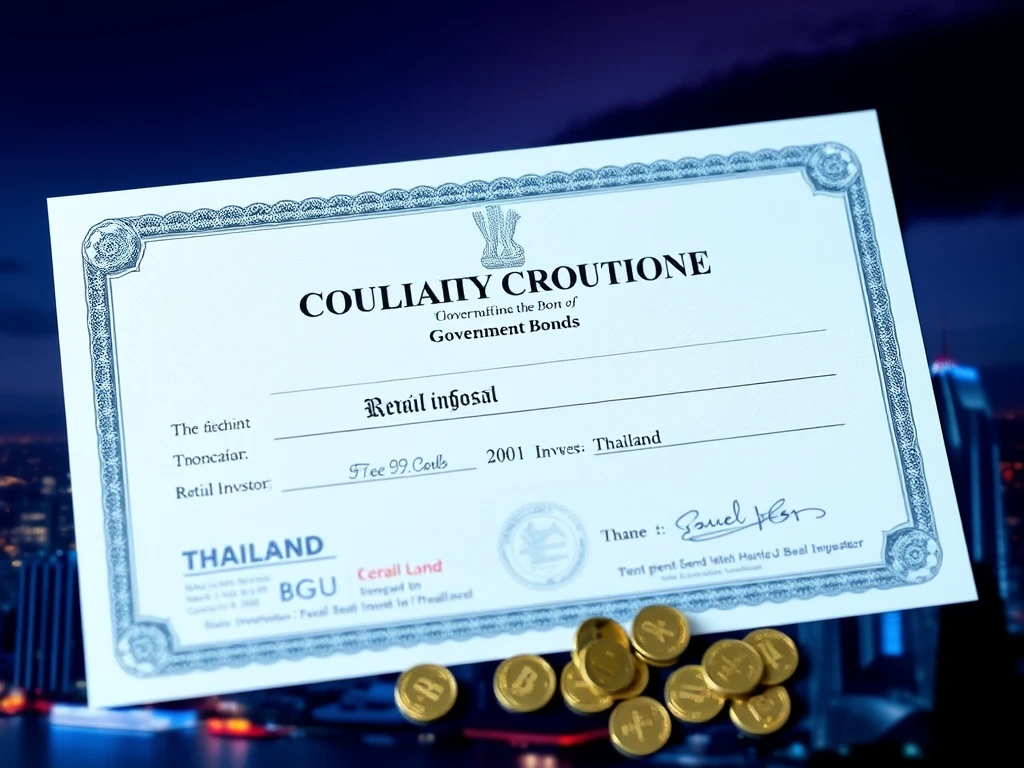Exciting: Thailand to Tokenize $150M Government Bonds for Retail Investors

For those following the convergence of traditional finance and blockchain, Thailand’s latest move is a significant development. The Thai government is stepping into the world of RWA tokenization, planning to issue a substantial amount of Thailand tokenized bonds. This initiative aims to open up investment opportunities previously limited to larger players, bringing retail investors into the fold with surprisingly low entry points.
Thailand Embraces Government Bonds Tokenization
Thailand’s Ministry of Finance has reportedly announced plans to issue $150 million worth of digital investment tokens, essentially tokenizing government bonds. Finance Minister Pichai Chunhavajira confirmed the cabinet’s endorsement of the plan, with the launch anticipated within the next two months. This move is part of the government’s current budget borrowing strategy.
The tokens, dubbed ‘G-tokens’, are designed to raise funds directly from the public. A key goal is enhancing accessibility. Patchara Anuntasilpa, director-general of the Public Debt Management Office, highlighted that a major benefit is allowing more retail investors to participate in the digital economy. Crucially, individuals could potentially invest for as little as $3.
Why This Matters for Retail Investors
Historically, access to large investment products like government bonds in Thailand has been challenging for the average retail investor, often favoring institutional or high-net-worth individuals. This tokenization effort aims to level the playing field. While specific yields weren’t disclosed, the Finance Minister suggested returns would be higher than typical bank deposit rates, which are currently quite low in Thailand (around 1.25% for a 12-month fixed deposit).
Here are some key takeaways for retail investors:
- **Increased Accessibility:** Low minimum investment ($3) removes a major barrier.
- **Digital Participation:** Allows retail investors to engage with the digital asset space via a familiar, low-risk instrument.
- **Potential for Better Returns:** Expected to offer higher yields compared to traditional savings accounts.
Understanding Digital Investment Tokens
It’s important to note that these G-tokens are described as digital investment tokens, not cryptocurrencies. They represent ownership in government bonds. They will be tradable on licensed digital asset exchanges within Thailand. However, access will be limited to Thai citizens residing in the country, as per the report.
Government bonds are debt securities where investors lend money to the government for a set period. In return, the government pays regular interest and repays the principal upon maturity. Tokenization simply represents this traditional asset on a blockchain or distributed ledger technology, potentially offering benefits like increased liquidity and fractional ownership.
Context: The Growing Trend of RWA Tokenization
Thailand’s initiative fits within a broader global trend of RWA tokenization, where real-world assets are brought onto the blockchain. Data from RWA.xyz indicates significant growth in this sector. The value of tokenized bonds globally reached $225 million recently, having doubled since the start of the year (though this figure tracks a limited number of issuers). More impressively, the value of tokenized US Treasuries alone has surged to $6.9 billion, up 73% this year.
This isn’t Thailand’s first foray into tokenized securities. In February, the securities regulator revealed plans for a tokenized securities trading system specifically for institutional investors. This new retail-focused G-token issuance appears to be the next step, designed initially to ‘test the market’, according to the Finance Minister.
Conclusion: A Step Towards Inclusive Digital Finance
Thailand’s plan to issue $150 million in Thailand tokenized bonds is a significant step towards making investment in government debt more accessible to retail investors. By leveraging digital investment tokens and setting a remarkably low minimum investment threshold, the government aims to broaden participation in the digital economy and its funding efforts. While details on yields are pending, the move highlights the increasing global adoption of government bonds tokenization and the potential of RWA tokenization to democratize traditional finance.










